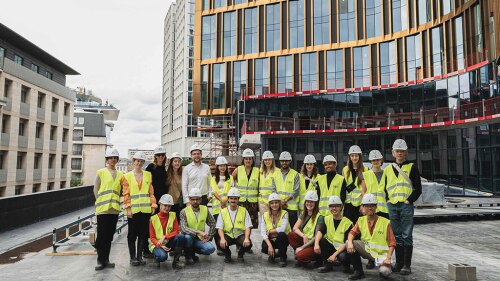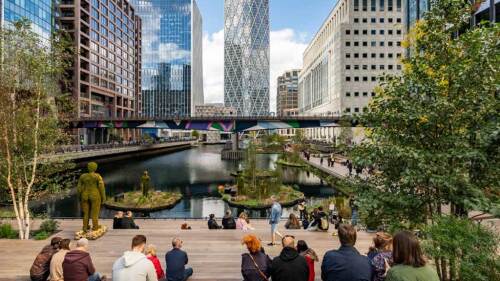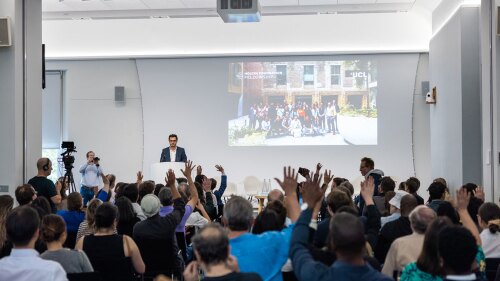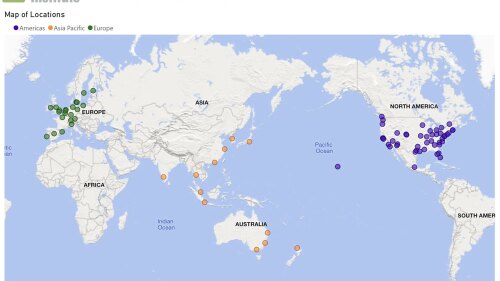Europe and the Middle East
National Councils are ULI’s country specific networks which bring together members working in the same location.
European Product Councils offer a unique opportunity for members across Europe to meet and share best practice with people operating in the same sector of the real estate industry.
ULI’s Young Leaders programme provides a forum for members under 35 years of age to network with their peers, gain exposure to senior industry professionals and continue their professional education and development.
ULI NEXT engages and supports members aged 35-45 into all of ULI’s activities.
Durkin joins ULI from BlackRock senior leadership, where he held the position of global head of real estate research and strategy. His appointment as CEO Europe marks a continuation of the Institute’s mission and momentum, reinforcing its focus on member value, decision-making relevance, and long-term impact across the built environment at a time of significant change for the industry in Europe and globally.
ULI Europe publishes new guide on asset-level collaboration to accelerate decarbonization of occupied buildings
For almost 200 years, the Warsaw Citadel in the heart of Poland’s capital was a restricted military and administrative area, cut off from public access. With the recent opening of the Polish History Museum, as well as the new Polish Army Museum, the 19th-century fortress’s 74-acre (30 ha) grounds now serve as a multifunctional facility and park that both preserves and showcases the country’s rich cultural heritage.
Steps from the Place de l’Europe in Paris, the French real estate company Covivio has recast a historic telephone exchange as its headquarters. Dubbed “L’Atelier,” the complex showcases the firm’s expertise, values, and culture; houses 250 Paris employees; and supports the company’s three business lines: office, hotel, and residential.
Holiday travelers may notice that airport-connected hotels are incorporating more regional touches, from façade to dining. Here are five examples that offer the ultimate luxury, a short walk from guest room to terminal.
With society and the real estate industry significantly behind on achieving the targets set in the Paris Agreement, and worsening affordability in Europe’s housing, ULI Europe’s C Change for Housing program has launched a landmark interactive systems map and companion report to help the real estate industry identify, co-create, and scale the solutions needed to decarbonize existing and future affordable housing.
Four exemplary real estate projects were named the overall winners of the 2025 ULI Europe Awards for Excellence from this year’s ten finalists. The diverse winning projects include a social housing project in Milan situated on an abandoned office development site, a new secondary school in Brussels developed in a former brewery, a new flexible life sciences hub in Stockholm, and an acute healthcare facility in Birmingham, which is intended as a catalyst for community regeneration.
Concerns about deglobalization surge, AI revolutionizes real estate, and top European cities for investment identified as London, Madrid, Paris, Berlin, and Amsterdam
How a two-week Fellowship by the Holcim Foundation and ETH Zurich turned the EU’s “Renovation Wave” into a practical playbook for policy, finance, and culture.
Ten built environment projects from eight countries across the EMEA region have been announced as the finalists in the sixth annual ULI Europe Awards for Excellence, which recognize exemplary projects and programs in the private, public, and non-profit sectors. This year’s finalists comprise cutting edge refurbishment, restoration and new build projects, and include residential, healthcare, mixed use, education, community, laboratory, and office projects from Italy, Germany, the UK, Belgium, Sweden, Denmark, France, and Spain.
A two-week program, hosted by UCL’s Department of Civil, Environmental & Geomatic Engineering and led by José Torero, Matthew Heywood, and Michael Woodrow, with a cohort of early-career professionals tested the limits of The London Plan and imaged what could lie ahead through a fellowship themed “Innovating Tomorrow’s Resilience.”
Despite geopolitical headwinds, green building regulations continue to gain momentum among local authorities. Many cities have moved beyond reporting requirements to demand practical, asset-level action. Numerous jurisdictions have introduced requirements on net-zero carbon and energy efficiency in buildings, fossil fuel-free heating, embodied carbon, electric vehicle (EV) charging facilities, and climate adaptation measures.

















